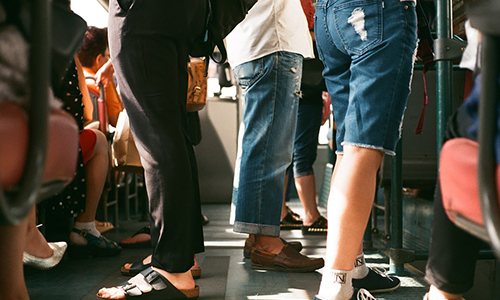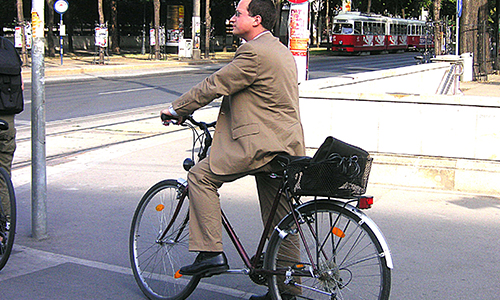Why You Should Commute by Bike
Author

A keen runner, skier and nuts about cycling. Karl lives in Cumbria, where he loves encouraging his two children to follow in his outdoor lifestyle. Whilst out and about keeping active, Karl keeps a diary and shares it with Outdoor Look.
 A recently published article in Environmental International has recommended that those who ride a bicycle to commute are healthier and experience lower levels of stress than walkers, drivers, and public transportation users.
A recently published article in Environmental International has recommended that those who ride a bicycle to commute are healthier and experience lower levels of stress than walkers, drivers, and public transportation users.
The article published with the title “The Effects of Transport Mode” is a section of a four-year study that concentrates on the relation between modes of transportation and a sequence of health and social interaction indicators. The series of indicators includes self-perceived health and stress, loneliness, energy levels, and regular interaction with friends and family. It is one of the most exclusive studies that is aimed to promote most active and beneficial transport. It is compiled in conjunction with transportation organisations, research institutions, and university professors all over Europe from 2014 to 2017, and 8,800 adult members were polled in 7 European cities including Antwerp, Belgium; London; Orebro, Sweden; Barcelona, Spain; Vienna; Zurich, and Rome.
Take a look at some of the primary takeaways of this study:
- Interaction and Community
The study indicates that biking may transform the way we experience our everyday trips. Essentially, biking compels us to slow down and communicate with the society and nature in a different way—something that can be unwinding, energising and generally more satisfying. In other words, bike riders have to interact with the surroundings, but can enjoy a little more of the daily commute than dealing with the bustling traffic. The bicyclists reported a lower stress level and improved mental health, resulting in positivity.
But biking advantages don’t appear to stop at self-satisfaction. The bikers also reported that they are less likely to experience loneliness. Dr. Anne Lusk, a research scientist specialising in bicycle transportation and infrastructure from Harvard University credits this to bicycling’s several “social bridges” that allow a positive engagement with a stranger, for instance a bike lane, a bike rack, or sometimes a bike itself can start a positive conversation.
- Lower Stress and Higher Energy
One of the vital takeaways of the study was that generally, the bicyclists were healthier, more energised and positive than their transportation peers. The survey recommends that this may be due to various factors but highlights that biking can help induce a feeling of independence and may be more joyful and calming than switching metro lines or driving a car.
Conversely, participants who said they drove a vehicle reported lower energy levels and higher stress levels that was ascribed to the car drivers who deal with traffic, noise and air pollution.
- A European Gain
 While Dr. Anne Lusk was ready to agree that the results of the study on the front are highly positive for biking and active transportation, she noticed that the outcomes were likely influenced by the present bicycle infrastructure in various European cities. For instance, cities like Vienna, Barcelona, and Antwerp have well-maintained bike lanes, where the bicyclists can ride side-by-side and are also protected from traffic. Also, she said that some U.S. cities need persistent state of vigilance for biking.
While Dr. Anne Lusk was ready to agree that the results of the study on the front are highly positive for biking and active transportation, she noticed that the outcomes were likely influenced by the present bicycle infrastructure in various European cities. For instance, cities like Vienna, Barcelona, and Antwerp have well-maintained bike lanes, where the bicyclists can ride side-by-side and are also protected from traffic. Also, she said that some U.S. cities need persistent state of vigilance for biking.
She said, “Bicycling has become this sort of sole activity as you have to ride in traffic and it is extremely stressful,”. The U.S. needs bike lanes just like other cities where families or seniors can bike together.
With the concerns of Dr. Anne Lusk and other biking infrastructure authorities in mind, the study reveals that its outcomes are intended to focus on a bicycle-centric infrastructure in urban and suburban regions.
So, stay mentally and physically healthy, engage the nature and individuals, and enjoy your commute by biking!
Author

A keen runner, skier and nuts about cycling. Karl lives in Cumbria, where he loves encouraging his two children to follow in his outdoor lifestyle. Whilst out and about keeping active, Karl keeps a diary and shares it with Outdoor Look.
Categories
- Sport (28)
- Product Reviews (3)
- Team Outdoor Look (7)
- Mike Wild (2)
- Mike Payton (2)
- Suse Hammond-Pears (3)
- Snowboarding (12)
- Latest Offers (105)
- Shop Talk (1)
- Competitions (7)
- Walking (413)
- Lifestyle Fashion (8)
- Travel (86)
- Kit Guides (176)
- Workwear Clothing (6)
- Safety Workwear (4)
- Health/Fitness (289)
- Skiing (91)
- Great Outdoors (1316)
- Cycling (92)
- January 2025
- December 2024
- November 2024
- October 2024
- September 2024
- August 2024
- July 2024
- June 2024
- May 2024
- April 2024
- March 2024
- February 2024
- January 2024
- December 2023
- November 2023
- October 2023
- September 2023
- August 2023
- July 2023
- June 2023
- May 2023
- April 2023
- March 2023
- February 2023
- January 2023
- December 2022
- November 2022
- October 2022
- September 2022
- August 2022
- July 2022
- June 2022
- May 2022
- April 2022
- March 2022
- February 2022
- January 2022
- December 2021
- November 2021
- October 2021
- September 2021
- August 2021
- July 2021
- June 2021
- May 2021
- April 2021
- March 2021
- February 2021
- January 2021
- December 2020
- November 2020
- October 2020
- September 2020
- August 2020
- July 2020
- June 2020
- May 2020
- April 2020
- March 2020
- February 2020
- January 2020
- December 2019
- November 2019
- October 2019
- September 2019
- August 2019
- July 2019
- June 2019
- May 2019
- April 2019
- March 2019
- February 2019
- January 2019
- December 2018
- November 2018
- October 2018
- September 2018
- August 2018
- July 2018
- June 2018
- May 2018
- April 2018
- March 2018
- February 2018
- January 2018
- December 2017
- November 2017
- October 2017
- September 2017
- August 2017
- July 2017
- June 2017
- May 2017
- April 2017
- March 2017
- February 2017
- January 2017
- December 2016
- November 2016
- October 2016
- September 2016
- August 2016
- July 2016
- June 2016
- May 2016
- April 2016
- March 2016
- February 2016
- January 2016
- December 2015
- November 2015
- October 2015
- September 2015
- August 2015
- July 2015
- June 2015
- May 2015
- April 2015
- March 2015
- February 2015
- January 2015
- December 2014
- November 2014
- October 2014
- September 2014
- August 2014
- July 2014
- June 2014
- May 2014
- April 2014
- March 2014
- February 2014
- January 2014
- December 2013
- November 2013
- October 2013
- September 2013
- August 2013
- July 2013
- June 2013
- May 2013
- April 2013
- March 2013
- February 2013
- January 2013
- December 2012
- November 2012
- October 2012
- September 2012
- August 2012
- July 2012
- June 2012
- May 2012
- April 2012
- March 2012
- February 2012
- January 2012
- December 2011
- November 2011
- October 2011
- September 2011
- August 2011
- May 2010
- April 2010
- March 2010
- February 2010
- January 2010
- November 2009
- October 2009
- September 2009
Submit a Comment